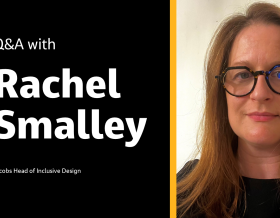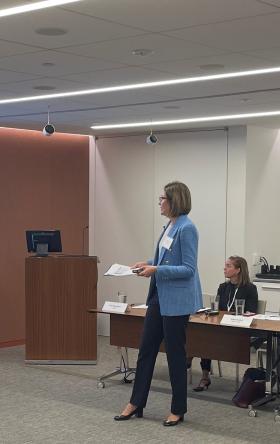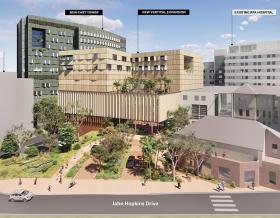

Nursing Home Design and COVID-19: Balancing Infection Control, Quality of Life and Resilience
Show Contributors: Dr. Diana Anderson, Dr. Desmond O’Neill, Thomas Grey, Paul Thies

In this episode of If/When, we spoke with Dr. Diana Anderson, Dr. Desmond O’Neill and Thomas Grey about the importance of the built environment for nursing homes and its impact on residents; what the COVID-19 pandemic revealed about existing challenges within nursing homes; and what an ideal environment for nursing home residents might look like going forward.
Episode notes
Diana Anderson, MD, M.Arch, is a healthcare architect and a board-certified internist. She completed her medical residency training at New York-Presbyterian Hospital, Columbia University Medical Center. As a “dochitect”, Dr. Anderson combines educational and professional experience in both medicine and architecture. She has worked on hospital design projects globally and is widely published in both architectural and medical journals, books and the popular press. She is a frequent speaker about the impacts of healthcare design on patient outcomes, staff satisfaction, and related topics. A Co-Founder of the Clinicians for Design group, this international network of leaders seeks to inspire and accelerate the design of environments and systems. She recently completed a geriatric medicine fellowship at the University of California, San Francisco. Alongside her work at Jacobs, Dr. Anderson is now pursuing a research fellowship in geriatric neurology at the VA Boston Healthcare System.
Having trained in Dublin and Bristol, Professor Desmond O’Neill is a consultant geriatrician at Tallaght University Hospital, chair of the National Centre for Arts and Health, and co-chair of Medical and Health Humanities in TCD. His research interests cover neuroscience, ageing and the humanities, and in terms of dementia have covered a range from driving with dementia, neuro-imaging and policy, to engaging with the arts to augment quality of life in dementia. With over 500 peer-reviewed publications, he has been the co-PI of the Irish National Audits of Stroke and Dementia Care, and led out on a range of policies relevant to ageing and dementia such as the national policy on elder abuse. His international profile includes presidency of the European Geriatric Medicine Society and he is the current chair of the Humanities and Arts Committee of the Gerontological Society of America. He has been honoured with the All-Ireland Inspirational Life Award in 2010 for services to older people, the Joseph T Freeman Award of the Gerontological Society of America.
Thomas Grey, Dip.Arch.B.Arch.Sci.MArch - Research Fellow, TrinityHaus, TCD, graduated from DIT Bolton Street in 1998 with an honours degree in Architecture. He moved to New Zealand in 2003 to complete a two-year Masters (Sustainability of the Built Environment) at the University of Auckland. With over 10 years in architectural practice working on projects in Ireland, the UK, Croatia, the US and NZ, Tom joined TrinityHaus Research Centre in TCD as a Research Fellow in 2009. Since then he has undertaken a variety of urban design and building design research projects examining how people-friendly design, architecture, and urbanism can support human performance, health, well-being and social participation. Much of this research focuses on age friendly and dementia attuned environments, and is underpinned by Universal Design and participatory design processes. Current projects include research and recommendations for the design of long-term residential care settings, design guidelines for Dementia Friendly Hospitals from a Universal Design Approach, the development of a Dementia Friendly Design Audit Tool, research into age-friendly housing.












2c4e.jpg?h=c7c14dee&itok=FmPI2126)


















_0ac2b.jpg?h=8a6d63f3&itok=5vsqFiQH)









2747.png?h=1314d3d4&itok=rFs9mG95)














